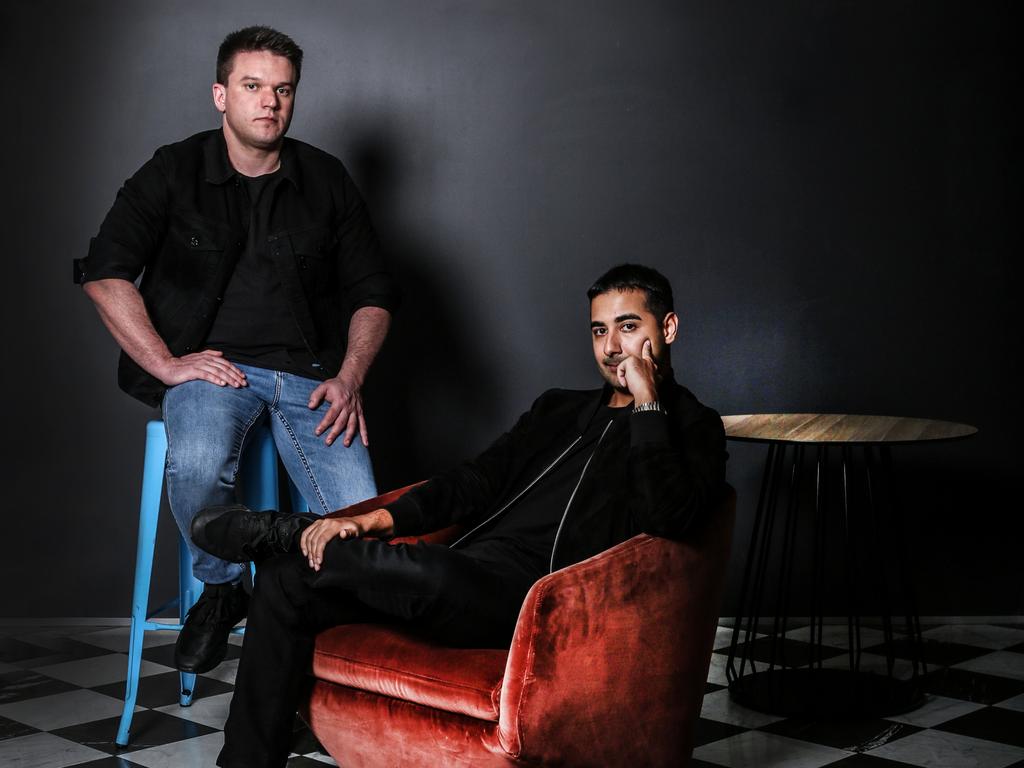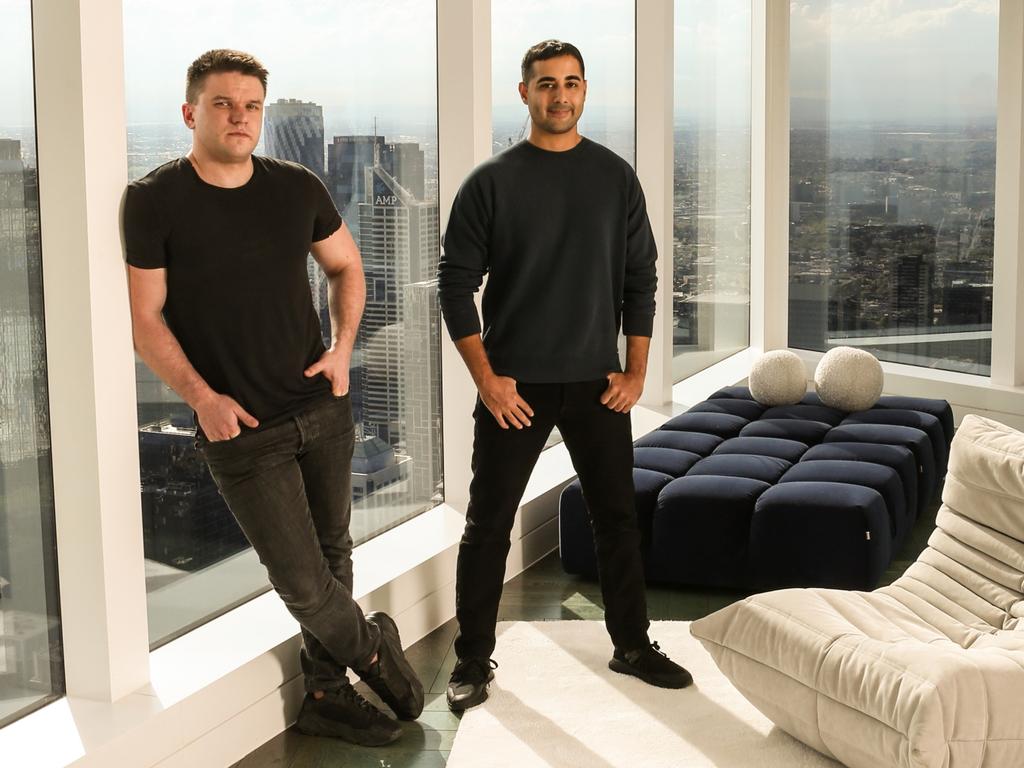From computer nerds to gambling with Drake: meet Melbourne’s crypto billionaires
A cryptocurrency casino run by “nerds” from Melbourne is now making as much money as supermarket giant Coles.

They’ve gone from teenage gaming ‘nerds’ to running the world’s biggest cryptocurrency casino.
And they’ve done it virtually unnoticed from an old bank building in Melbourne’s CBD.
Ed Craven, 27, a little-known Melburnian who is among the world’s youngest self-made billionaires and US business partner Bijan Tehrani, 28, are the founders of Stake.com.
The duo say it is the biggest gambling website in the world and regular clients include Drake – Craven and the Canadian hip hop superstar speak every day – who has livestreamed himself dropping a $1.5m bet on a virtual roulette table manned by a cartoon croupier.

They have built and run a business that has had more success at such an early stage than just about anyone else in Australian history, even though its activities are banned here.
They have also done it largely out of site – Craven burst into the headlines this year when he shelled out $88m for a “ghost mansion” in Toorak, a few months after paying $38.5m for a nearby house months earlier.
Documentation seen by The Australian shows that Stake customers bet an average $590m each day using cryptocurrency – although none of it in Australia where online casinos are banned.
The business is set to crack $1bn in profits this year – as much money as supermarket giant Coles makes and three times the earnings of the privately held Chemist Warehouse.
“The immediate goal is to become the largest betting brand and transcend just being known within the crypto industry, and really make Stake.com pretty much the first thing people think of when they think of online gambling,” says Craven.
“To really conquer the industry.”
So big is Stake that its owners claim it accounts for about 7 per cent of total Bitcoin transactions around the world daily.
“People have been trying to find the killer application for cryptocurrency,” says Tehrani.
“Well, it’s gambling.”

GAME ON
Craven and US-born Tehrani met during high school on a popular fantasy dragon-slaying website RuneScape which they ultimately got kicked off for operating an illegal casino within the game.
Craven was born in Sydney but his family would later move to Coffs Harbour after his father Jamie had been declared bankrupt and spent six months in jail in the late 1980s over the collapse of the financial group Spedley Securities.
Tehrani’s parents moved to the US from Iran as teenagers during the Islamic Revolution in the late 1970s.
By their early teenage years Craven and Tehrani had discovered computer games – much to their parents’ consternation.
“I definitely loved them a bit too much,” says Craven.
“Yeah, I was a nerd,” says Tehrani.

Like the Dungeons & Dragons board game players before them, RuneScape’s medieval looks and knights in shining armour appealed to teenagers, who stormed castles, cast spells, pickpocketed or went on buried treasure quests.
Of more interest to the duo, RuneScape players earned virtual gold coins.
That was lucrative enough, but even more of a money-spinner was an online casino of sorts that Tehrani decided to set up in one part of the RuneScape world, enlisting Craven’s help after the pair had been rivals within the game.
Gambling was a big hit on RuneScape and, to their parents’ astonishment, Craven and Tehrani were able to swap enough virtual coins for real money to each make about $100,000.
It was enough for Craven to help buy his parents a coffee shop franchise on the Pacific Highway at Coffs Harbour, fulfilling their ambition to run a cafe.
“Before then it was something imaginary,” Craven says with a smile.
“From then on, it clicked for them and they were more lenient in letting me play.”
RuneScape’s developers didn’t extend the same leniency: in 2011, Craven and Tehrani were banned from the game.

BITCOIN BOOM
By then, the cryptocurrency Bitcoin was starting to emerge.
Tehrani says he and his nerdy friends mined a small amount of Bitcoin themselves and also dabbled in playing an online game called Satoshi Dice.
Players sent Bitcoin to be used as a bet on dice rolls, with wins and losses based on numbers randomly generated via the blockchain.
Tehrani played but found the experience slow and clunky, and decided he could build a better version.
He asked Craven to help and the pair – who still hadn’t met in person – built their own cryptocurrency dice gambling website called Primedice.
“We didn’t really know each other,” says Tehrani.
“We were 17 and 18 and both pumped up our ages.”
While those in the know flocked to their new site, it started haemorrhaging money almost immediately, losing the pair between $10,000 and $20,000 per game.
But they held their nerve and soon the betting volume was sufficient to make the pair some money.
“It helped that there was nothing to do with Bitcoin back then,” says Tehrani.
“There were no established exchanges. People mined it, gambled it and bought drugs with it … but there were limited ways to spend it.”

PACKER: STAY IN YOUR LANE
By 2016, Craven was trying to drum up mainstream interest in his “provably fair” technology for online gambling.
The provably fair system is a mathematical method or algorithm that is used to ensure that neither the players nor casinos can know the result of the game before it begins.
Craven says he wrote white papers on the system, tried to patent it, held meetings with gambling authorities in Queensland and Tasmania and even reached out to gaming billionaire James Packer.
“Nothing eventuated,” Craven says.
“But I did end up getting an email from the EA [executive assistant] of James Packer, basically saying ‘stay in your lane’ and ‘by the way if you’re ever in Israel, let’s catch up’.”
In an email to The Australian, Packer says he doesn’t remember the exchange.
Tehrani says it was Packer’s email that gave him the final impetus to travel to Australia to meet Craven for the first time and figure out what they would do next.
“At this point I didn’t think Ed really knew what he was doing but I saw that email and if he’s pissing off these billionaires, he’s doing something that is scratching a nerve somewhere.”
Meanwhile, Craven had rented office space in Melbourne’s CBD and was thinking of doing something bigger than Primedice.
They eventually decided on launching an online casino using cryptocurrency only, buying the Stake.com domain name from a California businesswoman.

The pair say they sank “several million worth of crypto” into developing Stake, combining casino games with Primedice’s provably fair technology and launching it in 2017.
“Honestly, it was a flop,” says Tehrani.
It took two years of losing money, and a rejection or two from venture capitalists, but in time Craven and Tehrani would focus on providing casino games and making the website as gambler-friendly as possible.
Tehrani says they kept profit margins “absurdly low” and eventually, a big focus on slot machine games had online crypto gamblers flocking to their website.
Endorsement deals with the likes of Drake – who English soccer clubs Watford and Everton, mixed martial arts circuit UFC and motor racing drivers helped raise Stake’s profile.
An explosion in interest in cryptocurrencies boosted the business
More widely, Stake’s owners have their sights set on licences in the US, where several states have allowed digital betting after decades of bans.
They want to operate in Australia too – and they aren’t afraid of the competition.
Craven says that Melbourne will remain Stake’s headquarters and that he and Tehrani want to keep the business privately owned.
Tehrani plans to become an Australian citizen; he loves Melbourne and wants to bring his family over.
“We’re applying for [an Australian licence] now … and hopefully will get it in a year,” says Tehrani.
“Ed and I are pretty confident that whatever market we go into, we can make an impact.”
THE AUSTRALIAN





